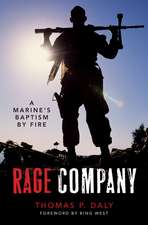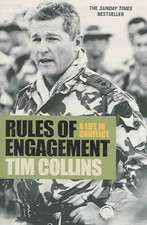The Strongest Tribe: War, Politics, and the Endgame in Iraq
Autor Bing Westen Limba Engleză Paperback – 31 aug 2009
Preț: 149.58 lei
Nou
Puncte Express: 224
Preț estimativ în valută:
28.63€ • 29.50$ • 24.17£
28.63€ • 29.50$ • 24.17£
Carte disponibilă
Livrare economică 10-24 februarie
Preluare comenzi: 021 569.72.76
Specificații
ISBN-13: 9780812978667
ISBN-10: 0812978668
Pagini: 443
Ilustrații: 16-PP PHOTO INSERT; 2 MAPS
Dimensiuni: 159 x 233 x 26 mm
Greutate: 0.51 kg
Editura: Random House Trade
ISBN-10: 0812978668
Pagini: 443
Ilustrații: 16-PP PHOTO INSERT; 2 MAPS
Dimensiuni: 159 x 233 x 26 mm
Greutate: 0.51 kg
Editura: Random House Trade
Notă biografică
Bing West was assistant secretary of defense for international security affairs under President Ronald Reagan. He served in the Marine infantry in Vietnam. Later, as an analyst at the RAND Corporation, he wrote the Vietnam classic The Village, that war colleges use as a primer in counterinsurgency. As a correspondent for The Atlantic Monthly, West has covered the war for five years. His books on Iraq - No True Glory: A Frontline Account of the Battle for Fallujah and The March Up: Taking Baghdad with the United States Marines (co-authored with MajGen Ray Smith)–have won the Marine Corps Heritage Foundation’s General Wallace M. Greene Jr. Award for nonfiction, the Colby Award for military nonfiction, and the Veteran of Foreign Wars Media Award. West is a member of the Council on Foreign Relations; his articles appear in The New York Times, The Wall St. Journal, and other major newspapers. He appears on National Public Radio and The Newshour with Jim Lehrer.
From the Hardcover edition.
From the Hardcover edition.
Extras
Chapter 1
How to Create a Mess
Summer 2003
In late March of 2003, Col. Joseph F. Dunford led 5,000 Marines in a wild dash up Highway One to seize Hantush Airfield, a major base south of Baghdad. Hidden behind dirt berms, Iraqi soldiers fired rocket-propelled grenades and machine guns at the tanks and Humvees roaring by. One machine gun concentrated its fire on a lead Humvee, killing Gunnery Sgt. Joseph Menusa.
When the fighting subsided, Dunford sent out a radio message that he was pushing north to Baghdad. As expected, the Iraqis took the bait and scrambled to block the highway, while Dunford shifted his regiment to fall on Baghdad from the east. At the last minute, higher headquarters ordered him to halt.
That night, I asked Dunford what had happened. He slowly took off his boots, choosing his words. He had brought enough foot powder to go for weeks with two pairs of socks, so you could listen to him without gasping. "Higher headquarters changed the mission," he said. "The main effort now isn't Baghdad; it's the supply lines to the rear. We're to wait."
The division commander, Maj. Gen. James N. Mattis, sent higher headquarters an angry message that the enemy would sniff out the planned feint, resulting in American casualties. "We should attack soonest," Mattis wrote. But three days passed before the Marines were allowed to attack, reclaiming the ground where Gunny Menusa had died. The lower levels had opened an opportunity that higher headquarters suppressed. Obstinately, high-ranking officials later denied that there was an alternative not taken. "There was never a pause," Defense Secretary Donald Rumsfeld told the press. Yet inside the Pentagon, Rumsfeld himself had demanded to know why the attack had stopped. Gen. Tommy Franks, in command of the invasion, was equally disingenuous in his memoir, claiming there never was a pause-because air attacks had continued.
Mattis disagreed. "I didn't want the pause. Nothing was holding us up," he told Inside the Pentagon. "The toughest order I had to give the whole campaign was to call back the assault force."
Because the campaign ended triumphantly, the incident seemed trivial. Senior levels had ignored the ground commanders, however, a tendency that would persist for several years because the war seemed impossible to lose. As a colonel in the 82nd Airborne Division said to me, "There's no threat that a well-trained platoon can't handle." To a hammer, every problem looks like a nail. The challenge, though, ?wasn't how to employ a platoon; it was how to change the conditions so that there would be no need for that platoon.
On the political and military level, roads not taken mark the history of this war. America was so powerful it seemed any road would lead to a quick exit. Until December of 2006, there was never a choice of "do this or lose." In 1864, President Abraham Lincoln knew he had to fire Gen. George B. McClellan or lose the war. In 1943, Gen. Dwight D. Eisenhower knew he had to refuse British entreaties to invade France or lose the war. No such historic choices loomed in Iraq.
Indeed, during the first year of the occupation, the going seemed so easy that we split the team and drove down two roads, getting stuck in the sand in both.
Organizing to Fail
After al Qaeda destroyed the Twin Towers in 2001, the American public was in no mood for quibbling. In Afghanistan, the Taliban was smashed quickly, while al Qaeda and Osama bin Laden retreated into Pakistan. Based on incorrect intelligence, the administration concluded that Saddam Hussein possessed weapons of mass destruction that he could give to terrorists. Secretary of State Colin Powell argued the case convincingly before the United Nations, and Congress voted to use force.
In the fastest blitzkrieg in history, the American and British forces sped 400 miles from Kuwait to Baghdad, rolling over and around a demoralized Iraqi Army that-having learned from the air bombardment in 1991-abandoned its armor. On April 9, 2003, the massive statue of Saddam was ripped from its pedestal in Firdos Square in Baghdad. Television images of joyous Iraqis dancing beside laughing American soldiers flashed across the globe. President George W. Bush and Secretary of State Powell stood side by side in the Oval Office, savoring the moment. Saddam's reign of terror had ended, but chaos was about to reign.
Throughout the city, American commanders stood off to one side as mobs rushed like locusts into hundreds of government buildings and stripped them clean. As looters danced by in carnival glee, I asked an American colonel what he was going to do to restore order.
"Nothing," he said. "I have no such orders. They deserve whatever they can haul away, after what Saddam did to them."
General Franks, in charge of Central Command, was soon to retire. He had achieved victory the good old-fashioned way- with tanks, air, and artillery, just as Kuwait City had been liberated in 1991 and Paris had been liberated in 1944. Once the war was over, he and Secretary of Defense Rumsfeld had agreed that retired Army Lt. Gen. Jay Garner would serve as the Central Command deputy for Phase IV-the occupation of Iraq.
Yet when fighting petered out in late April, the Phase III commander for combat operations, Lt. Gen. David McKiernan, kept control over all units. Central Command never passed control from Phase III to Phase IV. Garner was supposedly in charge, but the 173,000 soldiers in the invincible coalition did not work for him. He was stranded in Baghdad, his tiny staff out of touch and having to hitch rides to meetings. Garner was a deputy commander with no one to command.
On the Iraqi side, governance had collapsed. Most workers stayed home, electric power was sporadic, and the blast furnace heat of summer was approaching. General Franks flew into Baghdad for a photo op with his conquering generals, while on street corners tanks loitered as looters swarmed past. No one was in charge. Television crews captured the irony of the scene-an American military machine implacable in battle, flummoxed in peace.
For several weeks after Baghdad fell, Central Command was in charge and chose to do nothing. During the invasion, Rumsfeld took pride in showing off a list of fifty things that could go wrong, such as torching of the oilfields or massive oil spills. The error not mentioned was a collapse of the Iraqi government coupled with no American plan to restore it.
The lack of a postwar plan was caused in large part by longstanding Pentagon strategy. For decades, the military had designed force-planning guidance that emphasized fighting and swiftly winning a major war, then withdrawing quickly to be ready to fight somewhere else. This planning method ensured that the budget went to the fighting forces, while ignoring the forces needed for an occupation.
In early May, Ambassador Zalmay Khalilzad and Assistant Secretary of State Ryan C. Crocker visited Baghdad and left shocked by the chaos and the American paralysis. Washington responded not by addressing the systemic failures of a detached military and a rudderless administration, but by replacing Garner.
The administration offered Garner's job to five persons, including former senator Howard Baker (R-TN), a deft politician. Eventually Ambassador L. Paul Bremer III, who was acceptable to both Powell and Rumsfeld, took the job. A graduate of Yale and Harvard Business School, Bremer had followed up a successful career in the foreign service by working in private business for former secretary of state Henry Kissinger. "Jerry [Bremer] is a good man," Kissinger quipped, "but he's a control freak." This elicited raised eyebrows among those who had experienced Kissinger's controlling ways and suggested that the administration didn't know whether a savvy politician or a strong manager was best suited for ruling Iraq.
Bush designated Bremer his proconsul to Iraq, with the mission and resources to establish the new Iraqi government and its security forces. At the same time, he tasked the U.S. military with providing security until the Iraqis took over. The military reported to the secretary of defense, while Bremer bypassed Rumsfeld, using Condoleezza Rice, the national security adviser, as a back door into the White House. With the approval of the U.S. military, Bush had instituted disunity of command. The divisiveness between Bremer and the military was to grow steadily over the next year, severely hampering the war effort.
Franks applauded, warmly endorsing the sacking of his own deputy. Bremer would have more clout, Franks later explained, because he would be close to the president. The White House provided Bremer with a staff called the Coalition Provisional Authority, or CPA, an amalgam of young people living in tight quarters behind huge walls, shut off from Iraq. The staff had no identifiable criterion for selection, save a willingness to serve and approval by the White House.
CentCom was still responsible for Iraq's security. With Rumsfeld's approval, CentCom appointed Lt. Gen. Ricardo Sanchez, the most junior three-star in the Army, as the senior commander in Iraq. To support Sanchez in his Baghdad headquarters, a pickup staff called Joint Task Force 7, or JTF-7, was cobbled together from different commands.
The Baathist Purge
Bremer arrived in Baghdad in early May. Stunned to see looters on the streets, he suggested shooting a few to make an example. He apologized for the remark, though it did illustrate that he was not hesitant or ?weak-?minded. He showed that by swiftly issuing an edict banning from government all Baathists with the rank of colonel or its civilian equivalent.
The Baathist Party was the core administrative strength of Saddam's regime. Few could gain midlevel jobs such as teachers or town administrators without belonging to the party. In Iraq, the Baath Party union card was reserved mainly for Sunnis. Although Bremer equated them to the Nazis under Hitler, Baathists were less virulent or latently threatening. As a transnational ideology that both predated and survived Saddam's reign, Baathism was a loose amalgam of socialism and ?pan-?Arabism. In Iraq, millions were Baathists.
Bremer thought he was banning only the top one percent. Saddam, though, had so inflated military grades that colonels commanded battalions of 400 soldiers. Barring the deflated rank of colonel and its civilian equivalent threw out the middle-level managers.
Compounding the problem, de-Baathification was placed in the hands of Ahmed Chalabi, a wily Shiite expatriate with chameleon political adroitness and overarching ambition whose core support lay inside the upper reaches of the Pentagon. ?De-?Baathification became Chalabi's calling card to ingratiate himself with the Shiite community. He set about his task with energy and self-promotion, and the real and perceived effects of what he accomplished went far beyond what Bremer had intended. In his memoir, former director of central intelligence George Tenet cited 100,000 Iraqis "driven to the brink" by de-Baathification, a number hotly disputed by Bremer.
The Iraqi Army Dissolved
In late April, the U.S. Marines were sent from Baghdad into the south to occupy a dozen cities containing eight million Shiites spread across an area the size of Wyoming. Receiving little direction from the Coalition Provisional Authority, the division commander, Major General Mattis, devised his own plan. Called "Mad Dog" for his ferocity in battle, Mattis was a bachelor who lived to lead troops. A devotee of military history, he had built a private library with hundreds of obscure titles. To Mattis, the Shiite south was a return to the days of the Banana Wars in the early twentieth century, when small contingents of marines were sent off to obscure Latin American countries to fight guerrillas and train local constabularies. Drawing on those experiences, the Marines had written their own treatise on government. Called the Small Wars Manual, it was full of practical advice-such as how to harness mules-for advancing the principles of John Locke, including how to hold elections. Mattis looked forward to updating the manual. Combat operations were put aside; governance and the restoration of services were now his mission.
His boss, Lt. Gen. James T. Conway, fully agreed. Conway commanded the Marine Expeditionary Force, or MEF, which included the division, an air wing, and a logistics brigade. Conway sent home his artillery and tank units, signaling that the "kinetic" war was over. No more shooting. Infantry battalions would restore basic services and bring back normalcy. Marines would walk the streets without armor or helmets.
If someone shoots at you, Mattis told his troops, kill him and go back to work. The people are not your enemy. Your job is to establish a functioning government. Reorganize the Iraqi Army to provide local security. The MEF has the list of Iraqi units to be recalled to duty. In our sector, the 3rd Iraqi Division will help us.
On May 20, a tired, dirty Mattis walked into his modest division headquarters after visiting his units. He hated PowerPoint briefings. It was his habit to gather his staff, from PFC to colonel, in a circle to discuss the day's events. He liked to force sharp questions, insisting everyone stay until someone challenged him. On this evening, a lieutenant asked if the Marines would provide security after the Iraqi Army was disbanded.
"That's not gonna happen," Mattis said. "We're not homesteading here. The Iraqis have their own army."
The next day, Ambassador Bremer dissolved the Iraqi Army. The American divisions on the ground were not consulted. Instead, Bremer had the concurrence of the White House, the Pentagon, and the top level of the U.S. military. President Bush sent Bremer a congratulatory memo-"I agree fully; you're doing a great job!" The rationale was that the army was the hated enforcer of the Saddam rule, bloated in size, exploitive of the Shiites who formed its enlisted ranks, and commanded by Sunnis who had to be removed. Besides, the army no longer existed; it had dissolved itself, as unit after unit had deserted. At a press conference in Baghdad, the news was greeted as ho-hum.
That night, the lieutenant asked Mattis when all those out-of-work, pissed-off Iraqi soldiers- estimates ranged up to 400,000-would start an insurgency. "He nailed me," Mattis said. "That's what I get for being a ?wise-?ass, challenging smart lieutenants. We generals get too full of ourselves."
Ignoring a "Classical Guerrilla-Type Campaign"
During the summer of 2003, the Sunni insurgency predicted by the lieutenant did emerge. Its fuel was the Sunni belief that they had been disenfranchised. Six million Sunnis had lost their position of dominance over fifteen million Shiites. The decrees about high-level Baathists and about the army, coupled with Bremer rather than an Iraqi appearing on television as the ruler of the country, convinced many Sunnis that a pogrom loomed. The Americans had the power and the Shiites had the motivation. Persecution was the way top-level Baathists had acted. Now payback was coming.
After the invasion, there was no functioning central government and no representatives to the people. The eighteen provinces were left on their own. The mosques were the centers of social discourse and the imams were widely believed. In the Sunni areas, imams were free to preach hate, gloom, and sedition-and many did.
The insurgency blossomed spontaneously as small cells with no centralized leadership sprang up among tribes throughout the Sunni Triangle, which stretched 350 miles east from Baghdad and 400 miles to the north. Some of Saddam's coterie had fled to Syria with carloads of cash. They settled into comfortable villas and sent money and instructions back into Anbar Province, a vast expanse of desert and farmland stretching from the outskirts of Baghdad 280 miles west to Syria.
From the Hardcover edition.
How to Create a Mess
Summer 2003
In late March of 2003, Col. Joseph F. Dunford led 5,000 Marines in a wild dash up Highway One to seize Hantush Airfield, a major base south of Baghdad. Hidden behind dirt berms, Iraqi soldiers fired rocket-propelled grenades and machine guns at the tanks and Humvees roaring by. One machine gun concentrated its fire on a lead Humvee, killing Gunnery Sgt. Joseph Menusa.
When the fighting subsided, Dunford sent out a radio message that he was pushing north to Baghdad. As expected, the Iraqis took the bait and scrambled to block the highway, while Dunford shifted his regiment to fall on Baghdad from the east. At the last minute, higher headquarters ordered him to halt.
That night, I asked Dunford what had happened. He slowly took off his boots, choosing his words. He had brought enough foot powder to go for weeks with two pairs of socks, so you could listen to him without gasping. "Higher headquarters changed the mission," he said. "The main effort now isn't Baghdad; it's the supply lines to the rear. We're to wait."
The division commander, Maj. Gen. James N. Mattis, sent higher headquarters an angry message that the enemy would sniff out the planned feint, resulting in American casualties. "We should attack soonest," Mattis wrote. But three days passed before the Marines were allowed to attack, reclaiming the ground where Gunny Menusa had died. The lower levels had opened an opportunity that higher headquarters suppressed. Obstinately, high-ranking officials later denied that there was an alternative not taken. "There was never a pause," Defense Secretary Donald Rumsfeld told the press. Yet inside the Pentagon, Rumsfeld himself had demanded to know why the attack had stopped. Gen. Tommy Franks, in command of the invasion, was equally disingenuous in his memoir, claiming there never was a pause-because air attacks had continued.
Mattis disagreed. "I didn't want the pause. Nothing was holding us up," he told Inside the Pentagon. "The toughest order I had to give the whole campaign was to call back the assault force."
Because the campaign ended triumphantly, the incident seemed trivial. Senior levels had ignored the ground commanders, however, a tendency that would persist for several years because the war seemed impossible to lose. As a colonel in the 82nd Airborne Division said to me, "There's no threat that a well-trained platoon can't handle." To a hammer, every problem looks like a nail. The challenge, though, ?wasn't how to employ a platoon; it was how to change the conditions so that there would be no need for that platoon.
On the political and military level, roads not taken mark the history of this war. America was so powerful it seemed any road would lead to a quick exit. Until December of 2006, there was never a choice of "do this or lose." In 1864, President Abraham Lincoln knew he had to fire Gen. George B. McClellan or lose the war. In 1943, Gen. Dwight D. Eisenhower knew he had to refuse British entreaties to invade France or lose the war. No such historic choices loomed in Iraq.
Indeed, during the first year of the occupation, the going seemed so easy that we split the team and drove down two roads, getting stuck in the sand in both.
Organizing to Fail
After al Qaeda destroyed the Twin Towers in 2001, the American public was in no mood for quibbling. In Afghanistan, the Taliban was smashed quickly, while al Qaeda and Osama bin Laden retreated into Pakistan. Based on incorrect intelligence, the administration concluded that Saddam Hussein possessed weapons of mass destruction that he could give to terrorists. Secretary of State Colin Powell argued the case convincingly before the United Nations, and Congress voted to use force.
In the fastest blitzkrieg in history, the American and British forces sped 400 miles from Kuwait to Baghdad, rolling over and around a demoralized Iraqi Army that-having learned from the air bombardment in 1991-abandoned its armor. On April 9, 2003, the massive statue of Saddam was ripped from its pedestal in Firdos Square in Baghdad. Television images of joyous Iraqis dancing beside laughing American soldiers flashed across the globe. President George W. Bush and Secretary of State Powell stood side by side in the Oval Office, savoring the moment. Saddam's reign of terror had ended, but chaos was about to reign.
Throughout the city, American commanders stood off to one side as mobs rushed like locusts into hundreds of government buildings and stripped them clean. As looters danced by in carnival glee, I asked an American colonel what he was going to do to restore order.
"Nothing," he said. "I have no such orders. They deserve whatever they can haul away, after what Saddam did to them."
General Franks, in charge of Central Command, was soon to retire. He had achieved victory the good old-fashioned way- with tanks, air, and artillery, just as Kuwait City had been liberated in 1991 and Paris had been liberated in 1944. Once the war was over, he and Secretary of Defense Rumsfeld had agreed that retired Army Lt. Gen. Jay Garner would serve as the Central Command deputy for Phase IV-the occupation of Iraq.
Yet when fighting petered out in late April, the Phase III commander for combat operations, Lt. Gen. David McKiernan, kept control over all units. Central Command never passed control from Phase III to Phase IV. Garner was supposedly in charge, but the 173,000 soldiers in the invincible coalition did not work for him. He was stranded in Baghdad, his tiny staff out of touch and having to hitch rides to meetings. Garner was a deputy commander with no one to command.
On the Iraqi side, governance had collapsed. Most workers stayed home, electric power was sporadic, and the blast furnace heat of summer was approaching. General Franks flew into Baghdad for a photo op with his conquering generals, while on street corners tanks loitered as looters swarmed past. No one was in charge. Television crews captured the irony of the scene-an American military machine implacable in battle, flummoxed in peace.
For several weeks after Baghdad fell, Central Command was in charge and chose to do nothing. During the invasion, Rumsfeld took pride in showing off a list of fifty things that could go wrong, such as torching of the oilfields or massive oil spills. The error not mentioned was a collapse of the Iraqi government coupled with no American plan to restore it.
The lack of a postwar plan was caused in large part by longstanding Pentagon strategy. For decades, the military had designed force-planning guidance that emphasized fighting and swiftly winning a major war, then withdrawing quickly to be ready to fight somewhere else. This planning method ensured that the budget went to the fighting forces, while ignoring the forces needed for an occupation.
In early May, Ambassador Zalmay Khalilzad and Assistant Secretary of State Ryan C. Crocker visited Baghdad and left shocked by the chaos and the American paralysis. Washington responded not by addressing the systemic failures of a detached military and a rudderless administration, but by replacing Garner.
The administration offered Garner's job to five persons, including former senator Howard Baker (R-TN), a deft politician. Eventually Ambassador L. Paul Bremer III, who was acceptable to both Powell and Rumsfeld, took the job. A graduate of Yale and Harvard Business School, Bremer had followed up a successful career in the foreign service by working in private business for former secretary of state Henry Kissinger. "Jerry [Bremer] is a good man," Kissinger quipped, "but he's a control freak." This elicited raised eyebrows among those who had experienced Kissinger's controlling ways and suggested that the administration didn't know whether a savvy politician or a strong manager was best suited for ruling Iraq.
Bush designated Bremer his proconsul to Iraq, with the mission and resources to establish the new Iraqi government and its security forces. At the same time, he tasked the U.S. military with providing security until the Iraqis took over. The military reported to the secretary of defense, while Bremer bypassed Rumsfeld, using Condoleezza Rice, the national security adviser, as a back door into the White House. With the approval of the U.S. military, Bush had instituted disunity of command. The divisiveness between Bremer and the military was to grow steadily over the next year, severely hampering the war effort.
Franks applauded, warmly endorsing the sacking of his own deputy. Bremer would have more clout, Franks later explained, because he would be close to the president. The White House provided Bremer with a staff called the Coalition Provisional Authority, or CPA, an amalgam of young people living in tight quarters behind huge walls, shut off from Iraq. The staff had no identifiable criterion for selection, save a willingness to serve and approval by the White House.
CentCom was still responsible for Iraq's security. With Rumsfeld's approval, CentCom appointed Lt. Gen. Ricardo Sanchez, the most junior three-star in the Army, as the senior commander in Iraq. To support Sanchez in his Baghdad headquarters, a pickup staff called Joint Task Force 7, or JTF-7, was cobbled together from different commands.
The Baathist Purge
Bremer arrived in Baghdad in early May. Stunned to see looters on the streets, he suggested shooting a few to make an example. He apologized for the remark, though it did illustrate that he was not hesitant or ?weak-?minded. He showed that by swiftly issuing an edict banning from government all Baathists with the rank of colonel or its civilian equivalent.
The Baathist Party was the core administrative strength of Saddam's regime. Few could gain midlevel jobs such as teachers or town administrators without belonging to the party. In Iraq, the Baath Party union card was reserved mainly for Sunnis. Although Bremer equated them to the Nazis under Hitler, Baathists were less virulent or latently threatening. As a transnational ideology that both predated and survived Saddam's reign, Baathism was a loose amalgam of socialism and ?pan-?Arabism. In Iraq, millions were Baathists.
Bremer thought he was banning only the top one percent. Saddam, though, had so inflated military grades that colonels commanded battalions of 400 soldiers. Barring the deflated rank of colonel and its civilian equivalent threw out the middle-level managers.
Compounding the problem, de-Baathification was placed in the hands of Ahmed Chalabi, a wily Shiite expatriate with chameleon political adroitness and overarching ambition whose core support lay inside the upper reaches of the Pentagon. ?De-?Baathification became Chalabi's calling card to ingratiate himself with the Shiite community. He set about his task with energy and self-promotion, and the real and perceived effects of what he accomplished went far beyond what Bremer had intended. In his memoir, former director of central intelligence George Tenet cited 100,000 Iraqis "driven to the brink" by de-Baathification, a number hotly disputed by Bremer.
The Iraqi Army Dissolved
In late April, the U.S. Marines were sent from Baghdad into the south to occupy a dozen cities containing eight million Shiites spread across an area the size of Wyoming. Receiving little direction from the Coalition Provisional Authority, the division commander, Major General Mattis, devised his own plan. Called "Mad Dog" for his ferocity in battle, Mattis was a bachelor who lived to lead troops. A devotee of military history, he had built a private library with hundreds of obscure titles. To Mattis, the Shiite south was a return to the days of the Banana Wars in the early twentieth century, when small contingents of marines were sent off to obscure Latin American countries to fight guerrillas and train local constabularies. Drawing on those experiences, the Marines had written their own treatise on government. Called the Small Wars Manual, it was full of practical advice-such as how to harness mules-for advancing the principles of John Locke, including how to hold elections. Mattis looked forward to updating the manual. Combat operations were put aside; governance and the restoration of services were now his mission.
His boss, Lt. Gen. James T. Conway, fully agreed. Conway commanded the Marine Expeditionary Force, or MEF, which included the division, an air wing, and a logistics brigade. Conway sent home his artillery and tank units, signaling that the "kinetic" war was over. No more shooting. Infantry battalions would restore basic services and bring back normalcy. Marines would walk the streets without armor or helmets.
If someone shoots at you, Mattis told his troops, kill him and go back to work. The people are not your enemy. Your job is to establish a functioning government. Reorganize the Iraqi Army to provide local security. The MEF has the list of Iraqi units to be recalled to duty. In our sector, the 3rd Iraqi Division will help us.
On May 20, a tired, dirty Mattis walked into his modest division headquarters after visiting his units. He hated PowerPoint briefings. It was his habit to gather his staff, from PFC to colonel, in a circle to discuss the day's events. He liked to force sharp questions, insisting everyone stay until someone challenged him. On this evening, a lieutenant asked if the Marines would provide security after the Iraqi Army was disbanded.
"That's not gonna happen," Mattis said. "We're not homesteading here. The Iraqis have their own army."
The next day, Ambassador Bremer dissolved the Iraqi Army. The American divisions on the ground were not consulted. Instead, Bremer had the concurrence of the White House, the Pentagon, and the top level of the U.S. military. President Bush sent Bremer a congratulatory memo-"I agree fully; you're doing a great job!" The rationale was that the army was the hated enforcer of the Saddam rule, bloated in size, exploitive of the Shiites who formed its enlisted ranks, and commanded by Sunnis who had to be removed. Besides, the army no longer existed; it had dissolved itself, as unit after unit had deserted. At a press conference in Baghdad, the news was greeted as ho-hum.
That night, the lieutenant asked Mattis when all those out-of-work, pissed-off Iraqi soldiers- estimates ranged up to 400,000-would start an insurgency. "He nailed me," Mattis said. "That's what I get for being a ?wise-?ass, challenging smart lieutenants. We generals get too full of ourselves."
Ignoring a "Classical Guerrilla-Type Campaign"
During the summer of 2003, the Sunni insurgency predicted by the lieutenant did emerge. Its fuel was the Sunni belief that they had been disenfranchised. Six million Sunnis had lost their position of dominance over fifteen million Shiites. The decrees about high-level Baathists and about the army, coupled with Bremer rather than an Iraqi appearing on television as the ruler of the country, convinced many Sunnis that a pogrom loomed. The Americans had the power and the Shiites had the motivation. Persecution was the way top-level Baathists had acted. Now payback was coming.
After the invasion, there was no functioning central government and no representatives to the people. The eighteen provinces were left on their own. The mosques were the centers of social discourse and the imams were widely believed. In the Sunni areas, imams were free to preach hate, gloom, and sedition-and many did.
The insurgency blossomed spontaneously as small cells with no centralized leadership sprang up among tribes throughout the Sunni Triangle, which stretched 350 miles east from Baghdad and 400 miles to the north. Some of Saddam's coterie had fled to Syria with carloads of cash. They settled into comfortable villas and sent money and instructions back into Anbar Province, a vast expanse of desert and farmland stretching from the outskirts of Baghdad 280 miles west to Syria.
From the Hardcover edition.
Recenzii
"Balanced, panoramic assessment of the Iraq War by former Marine and Reagan administration veteran West (No True Glory, 2005, etc.), who heralds American soldiers as its unsung heroes amid the "fog of Washington". . .A timely, eye-opening historical analysis that provides clarity around the difficult choices the next president faces." —Kirkus, starred review
"In this important new chronicle of the war in Iraq, Bing West reveals how America reached the brink of defeat in 2006 and then managed in 2007 to stage a stunning turnaround. With its vivid, on-the-ground reporting, his book is a fitting tribute to the honor, valor, and toughness of our soldiers. Notwithstanding numerous mistakes by their leaders, West shows that their sacrifices have made success possible—as long we do not withdraw prematurely."—Senator John S. McCain
"Sometimes the best way to support the troops is to criticize the generals. Bing West does both well in this book, showing a sympathy for our soldiers and Marines, but also a great ear for military truth and a determination to render events accurately. This is his third and most important book about the Iraq war. Read it."
—Thomas E. Ricks, author of FIASCO: The American Military Adventure in Iraq
"A brilliant exposition. Based on extensive experience in the war zone, Bing West recounts how Soldiers and Marines showed the President and the Pentagon the way to solve the Iraq insurgency problem. Echoing the admonition that "all politics are local", The Strongest Tribe convincingly argues that it was a grass roots strategy developed by on-scene officers who forged ties at the tribal level that brought stability to Iraq's turbulent Anbar Province and provided hope for all Iraq."
—Lt. Gen. Bernard E. Trainor USMC (Ret.) Co-author of The Generals' War
and COBRA II: The Inside Story of the Invation and Occupation of Iraq
"Some four decades ago I told Bing West that his book, the Village, would become a classic in counterinsurgency warfare. And so it did. "The Strongest Tribe" will surely be West's second classic—a moving and detailed account of almost six years of war in Iraq." —Dr. James R. Schlesinger, Director of Central Intelligence Agency, Nixon administration; Secretary of Defense, Ford administration; Chairman, The Mitre Corporation
"West calls it like he sees it, and there is probably no American not wearing a uniform who has seen more of this war." —Washington Post Book World
"An authoritative testament . . . full of eyewitness accounts . . . [Bing] West, who served in Vietnam as a Marine infantry officer, is more than a battlefield observer. He is a military analyst who wants to show how counterinsurgency works."—Wall Street Journal
"In this important new chronicle of the war in Iraq, Bing West reveals how America reached the brink of defeat in 2006 and then managed in 2007 to stage a stunning turnaround. With its vivid, on-the-ground reporting, his book is a fitting tribute to the honor, valor, and toughness of our soldiers. Notwithstanding numerous mistakes by their leaders, West shows that their sacrifices have made success possible—as long we do not withdraw prematurely."—Senator John S. McCain
"Sometimes the best way to support the troops is to criticize the generals. Bing West does both well in this book, showing a sympathy for our soldiers and Marines, but also a great ear for military truth and a determination to render events accurately. This is his third and most important book about the Iraq war. Read it."
—Thomas E. Ricks, author of FIASCO: The American Military Adventure in Iraq
"A brilliant exposition. Based on extensive experience in the war zone, Bing West recounts how Soldiers and Marines showed the President and the Pentagon the way to solve the Iraq insurgency problem. Echoing the admonition that "all politics are local", The Strongest Tribe convincingly argues that it was a grass roots strategy developed by on-scene officers who forged ties at the tribal level that brought stability to Iraq's turbulent Anbar Province and provided hope for all Iraq."
—Lt. Gen. Bernard E. Trainor USMC (Ret.) Co-author of The Generals' War
and COBRA II: The Inside Story of the Invation and Occupation of Iraq
"Some four decades ago I told Bing West that his book, the Village, would become a classic in counterinsurgency warfare. And so it did. "The Strongest Tribe" will surely be West's second classic—a moving and detailed account of almost six years of war in Iraq." —Dr. James R. Schlesinger, Director of Central Intelligence Agency, Nixon administration; Secretary of Defense, Ford administration; Chairman, The Mitre Corporation
"West calls it like he sees it, and there is probably no American not wearing a uniform who has seen more of this war." —Washington Post Book World
"An authoritative testament . . . full of eyewitness accounts . . . [Bing] West, who served in Vietnam as a Marine infantry officer, is more than a battlefield observer. He is a military analyst who wants to show how counterinsurgency works."—Wall Street Journal
Descriere
From one of the most respected combat reporters in America comes a gripping battlefield history of how the U.S. military corrected its mistakes in Iraq and opened a path to victory.












